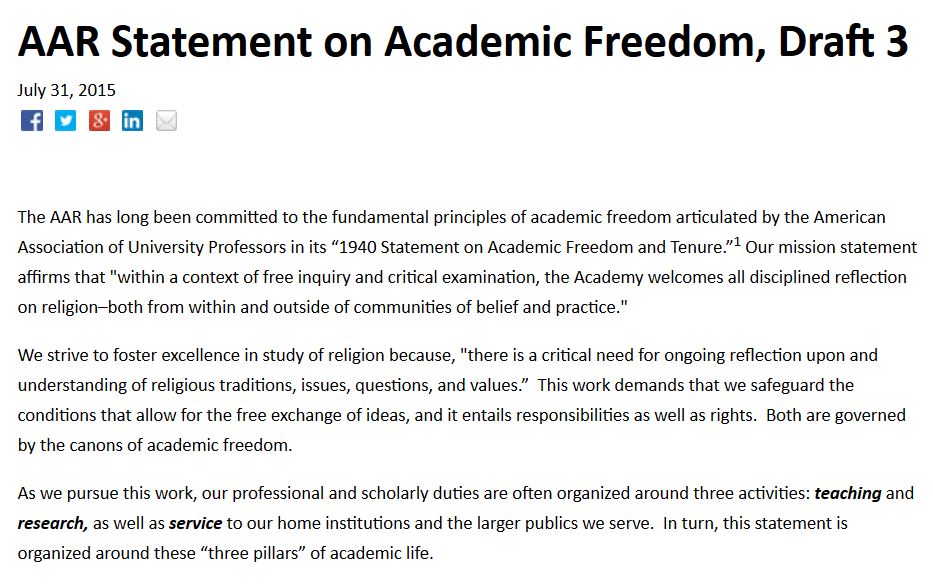 Recently, the Board of Directors of the American Academy of Religion released a draft update to its 2006 statement on Academic Freedom and the Teaching of Religion and solicited feedback from members. Given that the members of Culture on the Edge are all scholars of religion, some have opted to offer their feedback to the AAR via this short series of posts on our site. (An index to all the posts in this series can be found here)
Recently, the Board of Directors of the American Academy of Religion released a draft update to its 2006 statement on Academic Freedom and the Teaching of Religion and solicited feedback from members. Given that the members of Culture on the Edge are all scholars of religion, some have opted to offer their feedback to the AAR via this short series of posts on our site. (An index to all the posts in this series can be found here)
Merinda Simmons
The AAR Statement on Academic Freedom reads as rhetorically and intellectually scattered at best. The terms it leaves undefined (like “responsible”, “unsettling”, “sensitive”, along with a host of others) are not done any favors by the contradictory passages that directly undercut each other. Take, for instance, a couple of sentences early on in the Research section: “Researchers have the right to follow lines of inquiry where they lead but also the responsibility to exercise care, recognizing that our discoveries may have implications for the self-understanding and well being of students, colleagues, and members of the public. Criticism should not impede judicious critical scholarship, and our shared commitment to free inquiry means that scholars must be free from intimidation and free to form conclusions on the basis of shared scholarly norms, as understood by qualified peers.”
So which is it? We have the right to follow lines of inquiry where they lead but the responsibility to be exercise care when our findings might affect the “well being” of others. There’s a huge degree of vagueness here that would be enough on its own to challenge the statement, but what particularly strikes me is the fact that the very next sentence emphasizes that “scholars must be free from intimidation and free to form conclusions.” What of the intimidation resulting from a statement issued by the governing organization for scholars of religion suggesting we should somehow be privy to what makes for the well being of our students, colleagues, and public? Know your rights, but exercise care. Follow lines of inquiry, but don’t impede on the well being of others. And despite a statement trying to address some of these more nebulous gray areas of research and its implications, be free of intimidation and form what conclusions you will. Huh?
Later in the research section, we are told that “AAR members should be cautious in condemning unwanted speech or writing on the grounds that it violates standards of ‘civility,’ since sometimes that argument might allow unfair treatment and endanger free inquiry.” I don’t disagree, but…isn’t that dubious appeal to civility exactly the same embedded in the interest in care and well being above? So, I have to admit that, while I might see all sorts of potential problems with the rabbit holes various sections of the statement present (like the traditional definition of religion implicit at the outset in the mission statement that identifies “disciplined reflection on religion both from within and outside of communities of belief and practice”—the latter string of prepositional phrases says much inasmuch as it is present at all), I have trouble getting past my general confusion in order to articulate those critiques. The group drafting these statements would do better to take a stance clearly and directly and welcome the ensuing debates or critiques. Instead, it attempts to accommodate everyone, and in doing so, fails to say something of substance about academic freedom to anyone.
